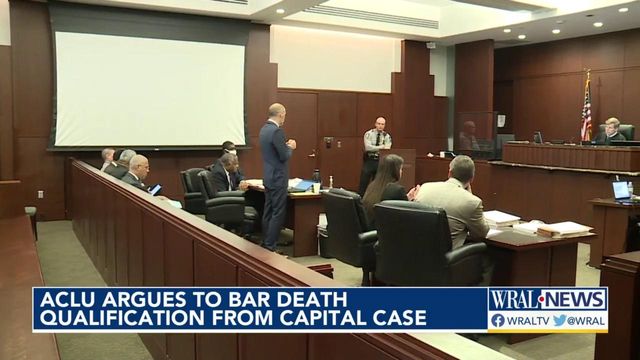Decision in motion to bar death qualification could change capital cases in North Carolina
Closing arguments have been made in the ACLU’s motion to bar the process of death qualification from the capital murder trial of Brandon Hill.
An upcoming decision from a superior court judge could change the way capital cases are conducted in North Carolina.
Raleigh police say in December 2016, Hill was caught on camera fatally shooting 28-year-old Dwayne Garvey at a motel.
Hill was charged with first-degree murder, and on Friday he appeared in court in Wake County with his attorneys. However, they weren’t there to argue Hill’s innocence.
For the past several months, Hill’s attorneys with the ACLU have been arguing a motion to bar death qualification from Hill’s capital case.
To serve on a capital jury in North Carolina, potential jurors have to be willing to sentence someone to either death or life in prison.
If a person says they couldn’t sentence a defendant to death, they’re removed from the jury.
Hill’s attorneys say a recent study from researchers at Michigan State University showed that in 10 of the last 11 capital cases in Wake County, Black jurors were removed under death qualification twice as often as white jurors, and Black women were removed at the highest rate.
Hill’s attorneys argue that using death qualification in this case would be unconstitutional, as it would deprive Hill of a representative jury of his peers.
“The denial of the franchise of the African-American community from the jury box is a persistent problem,” ACLU attorney Henderson Hill said. “And, it’s a painful problem.”
If District 10 Superior Court Judge Paul Ridgeway were to rule with the ACLU, it would set a significant legal precedent for future capital cases in North Carolina.
Arguing against the motion, the state defended death qualification, saying there would be no point in selecting jurors who wouldn’t be open to both options for sentencing.
When asked by Hill’s attorneys if death qualification is used to discriminate against black jurors, Wake County Assistant District Attorney Melanie Shekita replied, “I would dispute that.”
The lead prosecutor called the motion a political debate that should be carried out in the legislature, not a courtroom.
“All of it goes to show that this entire thing that we’ve been doing has nothing to do with this actual case,” Katy Pomeroy said.
Both sides made their closing arguments on Friday, and the judge is expected to rule in the coming days.
No start date has been set for Hill’s trial.












